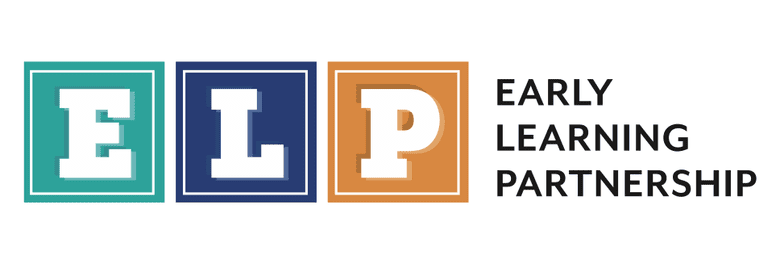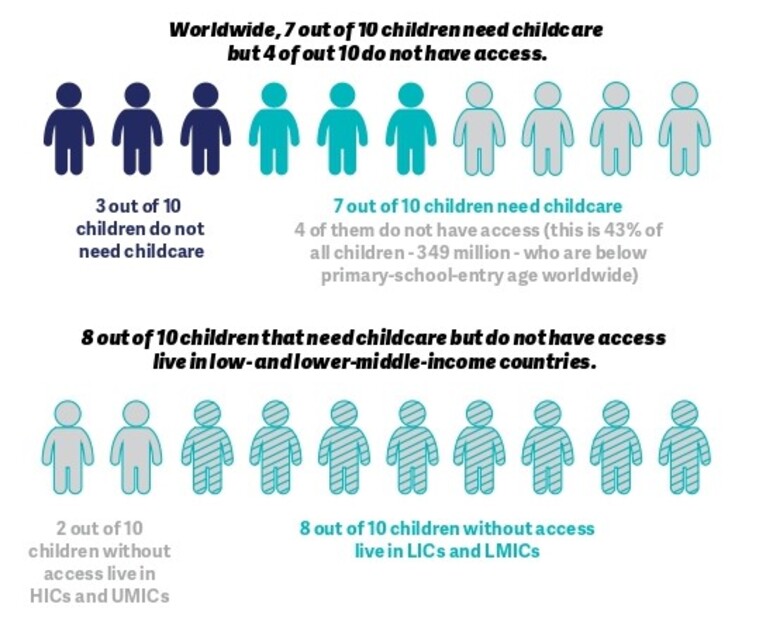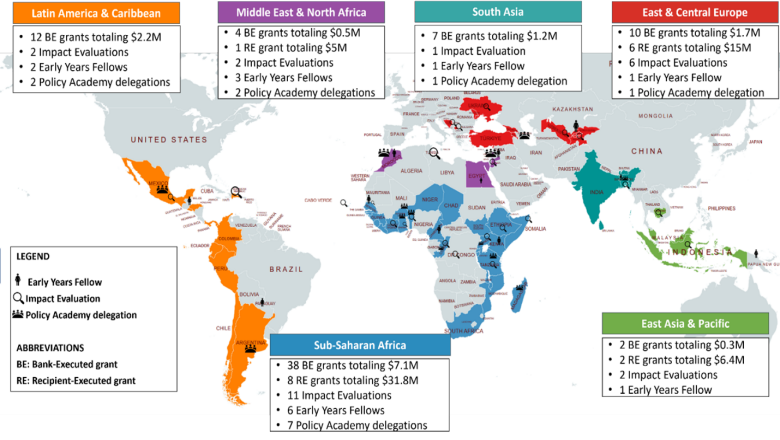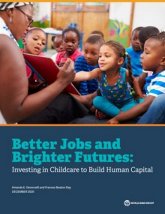Invest in Childcare
 | Driving more and better-quality investments in childcare to improve outcomes for women, children, families, businesses and economies. |
 |

 | Driving more and better-quality investments in childcare to improve outcomes for women, children, families, businesses and economies. |
 |
In 2022, the World Bank Group launched the Invest in Childcare initiative to drive investments in quality, affordable childcare.
Expanding access to quality, affordable childcare is among the most important investments that countries can make to build human capital, accelerate equality, and place women and children at the center of economic growth.
Over 40 percent of children globally—or nearly 350 million—below primary-school-entry age need childcare but do not have access to it. The childcare challenge disproportionately impacts families in low and lower-middle-income countries.

Invest in Childcare2, launched in 2022, is an ambitious cross-sectoral work program that strategically addresses the childcare challenge through research, major new data collection, policy changes and new operational approaches that can work at scale.
This work program supports the delivery of the new IDA20 policy commitment on childcare (“to support at least 15 IDA countries to expand access to quality, affordable childcare, especially for low-income parents”).
Invest in Childcare is supported by the governments of Australia, Canada, Germany and the United States; the Gates Foundation; the Conrad N. Hilton Foundation; Echidna Giving; the Hewlett Foundation; and the LEGO Foundation. Combined, these pledges will catalyze at least $180 million in new funding to support quality childcare in low- and middle-income countries worldwide. We are also working closely with other multilaterals, civil society organizations and academia to ensure we build on the great work many organisations and partners have been leading in this space. Regular consultations are held to share updates and gather feedback.
Working together, we can help governments meet five key policy goals to ensure quality, affordable childcare is available for all families that need it and secure better jobs and brighter futures:
1 Childcare refers to a service with the primary objective of caring for children while parents are working (or otherwise unavailable). Quality childcare should ensure children are safe and have opportunities to learn and develop positive relationships with caregivers and peers. Childcare provision mostly caters to children from birth up to primary-school-entry age (typically up to age 5-6) but can include after-school care. Childcare can be provided in different settings and financed through various modalities. It may be called various names in different contexts, but tends to fall into three categories: (i) center-based care (e.g. daycares, nurseries, crèches, etc.); (ii) home-based care (either care by someone in the child’s own home or care provided for a group of children in a caregiver’s home); and (iii) family and other informal arrangements (which may or may not be remunerated). Although the primary objective of preschool is to prepare children for primary school, it can also serve a childcare function if designed with consideration for the needs of working parents (e.g. offering full-day, as opposed to half-day, services).
2Invest in Childcare is an initiative of the World Bank’s Early Learning Partnership (ELP) Trust Fund (ELP is associated to the Foundational Learning Compact Trust Fund). The work is coordinated by the World Bank’s Early Learning Partnership (ELP), working with a cross-sectoral working group of WBG staff, which provides strategic direction and guidance. The working group includes members from Education, Gender, Social Projection and Jobs, Human Capital Project team, Health, Nutrition and Population, Poverty, Skills and Jobs and ECD Global Skills Groups, along with various research and survey units (Women Business and the Law, DEC, DIME, SIEF, Gender Innovation Labs, ECD Measurement) and IFC. In addition, various World Bank Group teams lead on specific pieces of work.
Last Updated: Apr 01, 2025
At the country level, the activities of the Invest in Childcare initiative focus on making the case for childcare and supporting countries to design and implement quality projects that maximize the benefits for women and children. This includes providing country grant funding, including catalytic country grants and match funding for projects, delivering technical assistance to country teams, and capacity building initiatives.
Country Grant Funding
The Invest in Childcare initiative provides two types of country grants to drive quality investments in childcare:
Catalytic grants (up to $250,000), which are executed by World Bank teams in collaboration with governments (Bank-Executed grants). Funding can be utilized in a variety of ways but typically includes conducting upstream analytical work that generates knowledge or helps to make the case for childcare, designing quality operations, providing technical support for implementation, or strengthening the enabling environment.
The first competitive round of catalytic grants was launched in 2022 and awarded $4.9 million to 26 proposals. The second round was concluded in 2024 and awarded $8.3 million to 47 proposals.
Match funding (up to $10 million) for World Bank-supported projects, which are implemented directly by governments (Recipient-Executed grants). Funds are available to country teams for childcare activities within World Bank operations on a 1:1 or 1:2 match basis. So far, $56.2 million has been awarded to 17 countries.
Impact evaluations: Additionally, the initiative is funding a series of impact evaluations for childcare that examine a broad range of outcomes including child development, women’s economic empowerment, family welfare and businesses productivity.
The map below provides an overview of country grants awarded to date:

Summaries of country level work
Listed below are a few examples of projects that have received catalytic country grants or match funding from the Invest in Childcare initiative. The full list of grants and evaluations is available here.
Examples of catalytic Bank-Executed grants
Argentina: Designing Childcare Options for Agri-food System Workers through Productive Alliances
In Argentina, Invest in Childcare funding will be used to support the design of childcare options for agricultural workers through: (i) a diagnostic of social norms, constraints and barriers faced by women in agricultural communities through focus group discussions; (ii) a series of consultations with public agencies, CSOs, firms and parents to identify feasible and relevant childcare models, including public private partnerships; and (iii) the design of an approach to deliver childcare in the agricultural communities surveyed, including the design of a curriculum that is meaningful for the agricultural context (e.g. green activities and children’s gardens). The team also plan to disseminate the findings at a regional level to promote policy discussion on rural childcare provision.
Bangladesh: Designing a community-based childcare model for women not in education, employment or training (NEET)
Invest in Childcare funding will be used to design a community-managed childcare model in Bangladesh to promote the participation of young women that are Not in Education, Employment or Training (NEET). Four activities will be financed: (i) situation assessment of supply and demand focusing on rural areas; (ii) design of a tailored community-based childcare model; (iii) design of an impact evaluation, project monitoring framework, and tools; and (iv) knowledge sharing and policy guidance. This model would be piloted through a new World Bank-financed operation.
Republic of Congo: Supporting women entrepreneurs to start or grow childcare businesses
In the Republic of Congo, Invest in Childcare funding will be used to pilot an approach to support women to start childcare businesses as an income generating activity within a women’s empowerment project. Start up grants will be provided through the project and Invest in Childcare funding will support: (i) a rapid assessment of the demand and supply of home- and community-based childcare services for vulnerable households in urban and peri-urban areas; (ii) the identification and training of childcare entrepreneurs interested in starting or growing a childcare business; (iii) ongoing coaching and mentoring for the childcare entrepreneurs and (iv) the monitoring and dissemination of lessons learned, development of an implementation manual and sharing a pilot report and a case study to foster government dialogue around childcare.
Ghana: Improving childcare provision in Ghana's Safety Net Programs
Invest in Childcare funding will be used to promote women’s participation in Ghana’s Safety Nets Program by improving childcare provision in labor-intensive public work sites. Four activities will be financed: (i) the development of childcare standards and training materials for providers; (ii) delivery of training through a train-the-trainer approach to providers in target districts; (iii) a process evaluation of the pilot to capture lessons learned from implementation, on quality and uptake, satisfaction of parents and childcare providers, and recommendations for scale up; and, (iv) dissemination activities with public and nonstate actors.
Kenya: Integrating childcare into a youth employment program to enable participation and as a training/employment track
In Kenya, Invest in Childcare funding will be used to support the identification of cost-effective, scalable childcare models to provide access to children of women participating in the National Youth Opportunities Towards Advancement Project (NYOTA) to improve their employability. Funding will support: (i) the identification and documentation of available childcare models suitable for vulnerable youth that could be piloted and later scaled up through the project; (ii) the preparation of guidelines and recommendations for integrating childcare in NYOTA; and (iii) exploring options to support childcare employment both as a training track within NYOTA and through provision of childcare to NYOTA participants.
Regional East Africa: Understanding maternal employment and inclusive childcare for mothers of children with disabilities
Invest in Childcare funding will be used to deepen the understanding of childcare options for mothers of children with disabilities and develop guidance for policies and projects. The analysis will be based on a global literature review as well as deep dive studies in Tanzania, Kenya and Uganda. The funding will support: (i) demand side analyses to understand how parenting demands and the availability of childcare impact the employment of mothers of children with disabilities; (ii) supply side analyses on the inclusivity of childcare centers; and (iii) the development of a global guidance/toolkit that encourages investments in disability-inclusive childcare and identifies promising practices and key considerations for policies and projects. Results from the study and the country briefs will be disseminated amongst stakeholders via webinars and workshops at the global and country level.
Examples of Recipient-Executed grants
Cote d'Ivoire Health, Nutrition, and Early Childhood Development Program for Universal Health Coverage (UHC), P179550: Leveraging a community health, nutrition and ECD platform to provide quality childcare services
The Project is improving the utilization of quality health, nutrition and early years development services, particularly for women, children and poor populations. Invest in Childcare has invested $5 million (matched by $5 million IDA) to support community centers that already provide various early childhood development services (including nutrition, health and early stimulation) to also offer improved childcare services through increasing the days and hours that childcare services will be available for and improving the quality of provision. Funding will be used to develop quality standards and implementation guidance for the childcare provision, to train practitioners, and to modify existing community spaces to safely provide quality childcare for very young children.
Jordan Enhancing Women’s Economic Opportunities, P180508: Expanding access and take up of childcare through start-up grants, subsidies for low-income households, and an online service platform
The Enhancing Women’s Economic Opportunities in Jordan Project is designed to address constraints that women face to enter and stay in the labor force including lack of access to quality childcare. Invest in Childcare is supporting the Government of Jordan to expand access to affordable quality childcare services through: (i) providing grants and in-kind support to establish center-based nurseries and home-based-nurseries; (ii) subsidizing the cost of childcare for children aged 0-5 among social safety net recipients who demonstrate an interest in participating in the labor force; and (iii) establishing a government operated online platform that brings together providers and families, which is also linked to the National Unified Registry of families seeking social assistance. Invest in Childcare has invested $5 million (matched by the $4 million Investment Project Financing (IPF) component for piloting childcare grants and subsidies and $92.5 million from the Performance for Results (PforR) component associated with childcare policy reforms).
Moldova (Moldova Education Quality Improvement Project, P179363: Expanding access to childcare for vulnerable populations and Ukrainian refugees and training practitioners
The objective of the project is to improve the learning environment of education institutions (including early education and care centers (ECEC)) and to better support vulnerable Moldovan families and refugees from Ukraine. Invest in Childcare has invested $5 million (matched by $10m IBRD), to expand access to vulnerable and refugee families (with a focus on full day services) and to strengthen workforce capacity through in-service training.
Tanzania Project for Advancing Gender Equality (PAMOJA) (P178813): Expanding access to childcare in the Mainland and Zanzibar by establishing community-based childcare centers and developing a national practitioner framework
The objective of PAMOJA is to increase access to economic opportunities for women and Gender-Based Violence prevention and response services, in targeted areas of the United Republic of Tanzania. Invest in Childcare has invested $4.5 million (matched by $4.5 million IDA) to: (i) operationalize 200 community day care centers (CDCCs) in the mainland and Zanzibar; (ii) train caregivers for the CDCCs; (iii) develop a national practitioner framework; and (iv) develop a digital quality assurance system to support monitoring and adherence to quality standards.
Capacity Building Initiatives
The Invest in Childcare initiative enacts a range of capacity-building efforts, including:
Childcare training for Early Years Fellows: The Early Years Fellowship was launched by the World Bank Group‘s Early Learning Partnership to support governments and World Bank teams to scale up investments in early childhood development. The Invest in Childcare team developed a childcare training module for Fellows that covers the rationale for childcare investments, operationalizing childcare investments in the World Bank, different modalities, quality assurance. Fellows were trained in February 2023.
Early Childhood Policy Academy (Formerly Engaging Policymakers to Invest in Childcare): This is an 18-month program designed to increase the volume and improve the quality of investments in childcare and related early childhood interventions through engaging with experts and South-South virtual and in-person learning activities. 13 countries are participating (selected out of 25 applicants. Policymakers have reported that activities have been helpful to diagnose their childcare systems, learn from peers, and support stronger coordination to plan and implement childcare services.
Self-paced learning: Introduction to Investing in Childcare is a self-paced course designed for practitioners, policymakers, and others who are interested in understanding the rationale for investing in childcare. The course is free, virtual, and can be completed at your own pace. The course explores why childcare matters, the scale of the global childcare challenge, and actions governments can take to ensure childcare is available, affordable, of decent quality, and responsive to the needs of all families. Throughout, the course highlights a variety of childcare provision models in diverse contexts with a practical focus on challenges, good practices, and lessons learned. Visit here to explore the course. First time users of the Open Learning Campus can create an account using this link to access the course.
Last Updated: Apr 01, 2025
The World Bank has supported nearly 50+ publications on childcare. For a complete list of all publications, organized by global and regional reach, please click here.
 | Better Jobs and Brighter Futures: Investing in Childcare to Build Human Capital Report - English | French | Spanish | Portuguese | Russian | Arabic This paper presents the evidence on why childcare matters, looks at the current status of childcare provision globally, and proposes specific actions countries can take to expand access to quality, affordable childcare for all families that need it, especially the most vulnerable. The paper was produced with substantial contributions from staff from across the World Bank. Executive Summary - English | French |Spanish | Portuguese | Russian | Arabic |
 | IFC: Tackling Childcare: The Business Case for Employer-Supported Childcare (2017) – English This report discusses how companies can analyze their workforce to identify the type of childcare support they can offer to their employees – from on-site childcare to subsidies – that best suits their needs. The report draws on 10 case studies from companies around the world offering various childcare options and family-friendly policies. |
Tools and resources
Building on existing resources, the Invest in Childcare team is developing tools and guidance on essential childcare-related subjects. The list below presents currently accessible tools and resources, as well as those expected to be publicly available soon.
Initiating dialogue and review of evidence
| Rationale for childcare investment
|
Collecting data
| Situation assessments
|
Strengthening the enabling environment
 | Quality assurance
Workforce development
Gender and social norms
|
Designing and piloting different policy options and childcare modalities
 | Childcare policy options
Different childcare modalities and types of provision
|
Measuring outcomes
 |
|
How inclusive policies and in-house childcare are transforming women’s careers in Pakistan’s energy sector Shibuya (2025)
Promoting equal opportunities and women's empowerment through childcare in Benin Branders, Agbeshie, Ogoundele, and Rougeaux (2025)
Creating jobs for women, and podcasting about it with AI Beegle and Galasso (2024)
Finding a Pathway to Employment for Young Women in Benin Agbeshie, Pierotti, Duell, and Rivas (2024)
The catalyst to unleash women’s economic potential in Africa - Childcare Fernandez Gorostidi, Troiano, Udechukwu (2024)
From care burden to economic opportunity: The case for childcare in Africa Friedson-Ridenour, Hailemicheal, Papineni (2024)
Fostering childcare to enable female labor force participation in Bhutan Niesten and Humphry (2024)
How investing in childcare drives economic growth for Indonesia O’Donnell (2023)
Child’s play, Women’s progress: Reforming childcare in The Gambia Ahmed, Hilger, Weaver, Bah, and Camara (2023)
Expanding access to childcare helps women, children, and economies Brixi, Devercelli, Rutkowski, and Saavedra (2022)
Financing childcare: Understanding the return-on-investment opportunity O’Donnell, Bourgault, Beaton-Day, and Ahmed (2022)
Initiating dialogue and review of evidence
Rationale for childcare investment
Last Updated: Aug 21, 2025
“Invest in Childcare Stakeholder Update Meeting”. Hosted by the Invest in Childcare Initiative in November 2025 (event recording, slides, update briefing circulated before the meeting).
The Invest in Childcare team hosts and participates in regular events about childcare and related topics. Below is a list of past recorded events.
Past recorded events
Last Updated: Jul 17, 2025